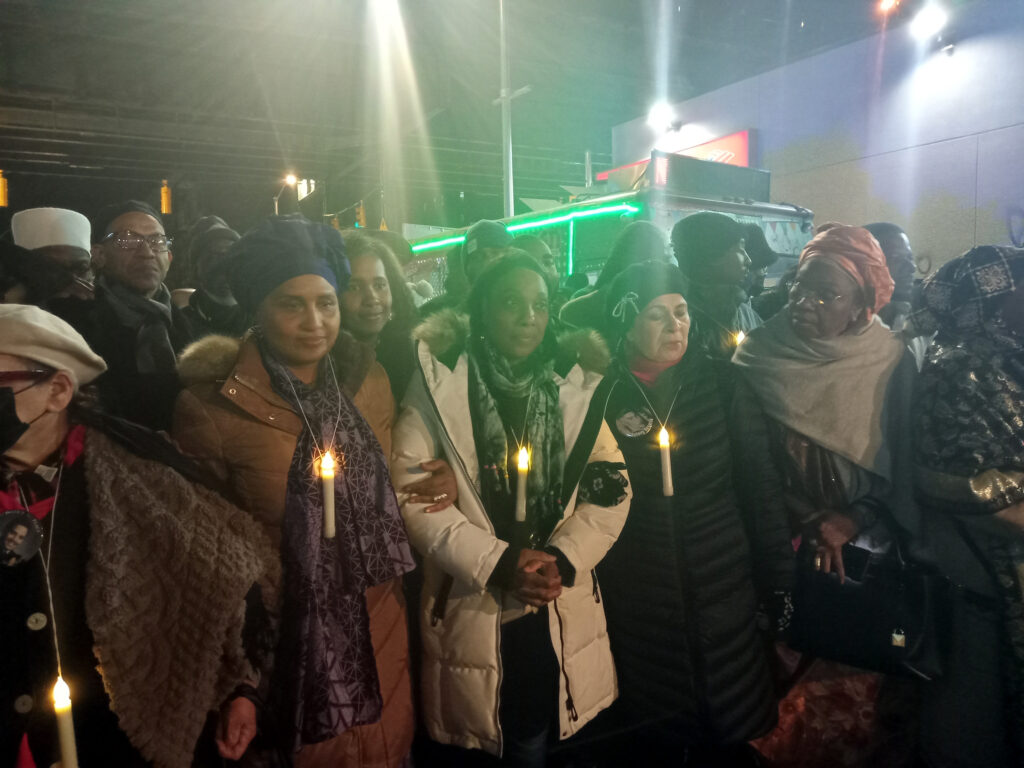
Photo by Sherica Daley
Fervently chanting “Amadou! Amadou!” a large crowd of Bronx residents, activists, lawmakers, and clergy joined family members of both the late Amadou Balio Diallo and other young, Black men killed by police in the Soundview section of The Bronx on Saturday, Feb. 3, for a vigil marking the 25th anniversary of Diallo’s death. According to police and media reports at the time, Diallo, a Muslim Guinean, died after he was shot 19 times by police on Wheeler Avenue in Soundview shortly after midnight on Feb. 4, 1999. He was unarmed and aged 23.
Emotions were still raw during the candlelight vigil as attendees revisited the memory of that tragic night. DRUM, aka Desis Rising Up & Moving, a Queens-based community social justice organization of working-class South Asians & Indo-Caribbeans, wrote on social media ahead of the vigil, “25 years ago today, 4 NYPD officers killed Amadou Diallo, an immigrant & street vendor, in a hail of 41 bullets” [19 of which hit Diallo].
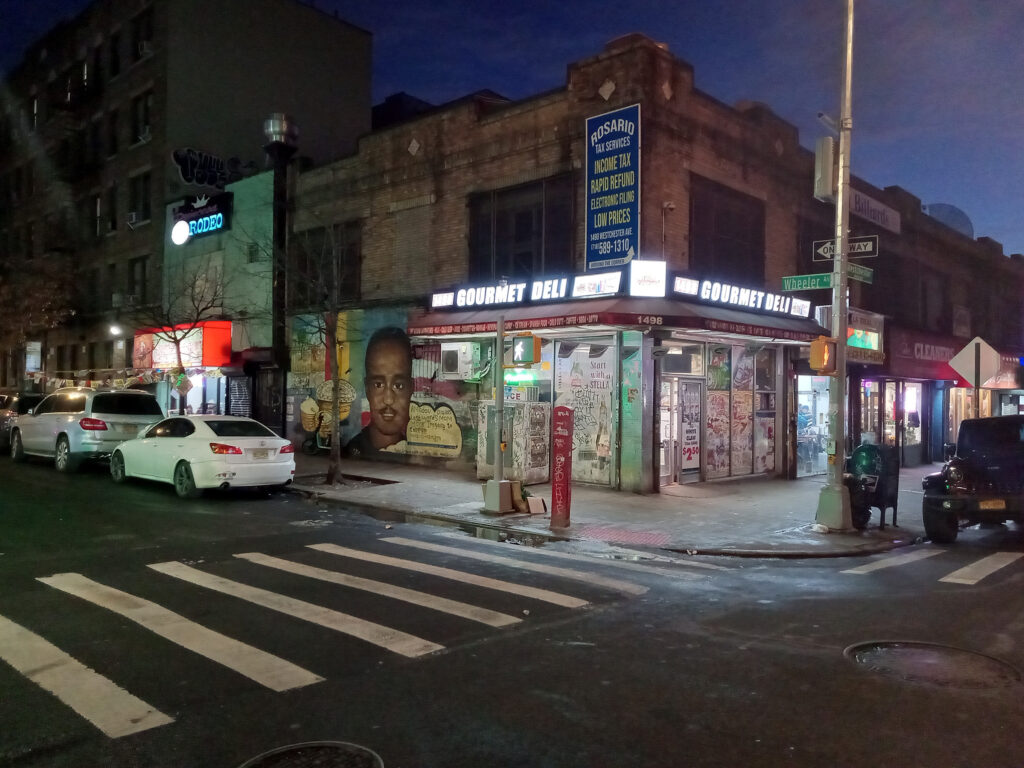
Photo by Sherica Daley
DRUM’s post continued, “DRUM was founded as a response to Amadou’s murder, to make the connections between policing, immigration, and workers. Join us today to stand with family.” The group tagged The Amadou Diallo Foundation, “a nonprofit dedicated to providing academic scholarships, justice-system accountability, racial equity, and a moral society.”
According to those gathered, this year’s vigil was not only an occasion to remember the tragedy of Diallo’s killing but also a time to protest police brutality, and a vow by organizers never to forget those unjustly killed by gun violence at the hands of police. “We here to be heard!” shouted Graham Weatherspoon, board member of the Amadou Diallo Foundation during the rally. “We here to fight and continue to fight!” he shouted.
Meanwhile, community activist and educator, Lumumba Bandele, angrily said, “This is time that the City should feel shame, especially the mayor!” She continued, “Our City’s mayor should be here with us!” Artist and poet, C. Liley, a first-generation American whose father is from Jamaica and whose mother is from Bermuda, told ABC7 of his childhood recollection of Diallo’s shooting, “I saw the fear on their (his parents’) faces, even as a child, when they saw the news story go across the screen on ABC7.”
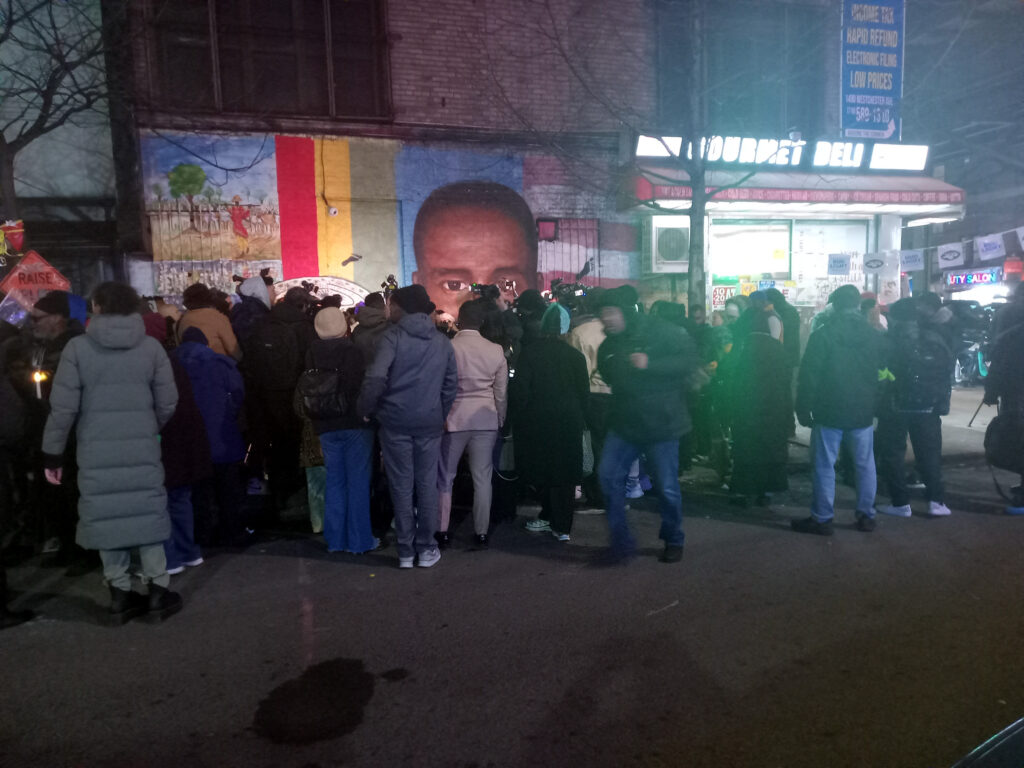
Photo by Sherica Daley
According to a report published at the time by the New Yorker, NYPD plainclothes officers, Sean Carroll, 35, Richard Murphy, 26, Edward McMellon, 26, and Kenneth Boss, 27, were on “stop-and-frisk” patrol in the area. The stop-and-frisk program in New York City, also known as a “Terry stop” and later deemed unconstitutional, was a prevailing NYPD practice of temporarily detaining, questioning, and at times searching civilians and suspects on the street for weapons and other contraband.
According to a report by the New York Times, the court heard that Carroll alleged he mistook Diallo for a serial rape suspect as he stood in the doorway of his Soundview apartment building. According to reporting by the NY Daily News at the time, McMellon had reportedly shouted to Diallo, “Police! Show me your hands!” The officers alleged Diallo did not comply and as he started to retrieve his black wallet from his pocket, and turned back towards them with the wallet in his hand, they mistook it for a gun and shot him.
During the subsequent trial, according to reporting by the New York Times, the prosecutor, Eric Warner said it was very likely that when Diallo reached into his pocket he was either looking for money to surrender to who he perceived was a group of robbers, or for identification to show who he may have perceived were police.
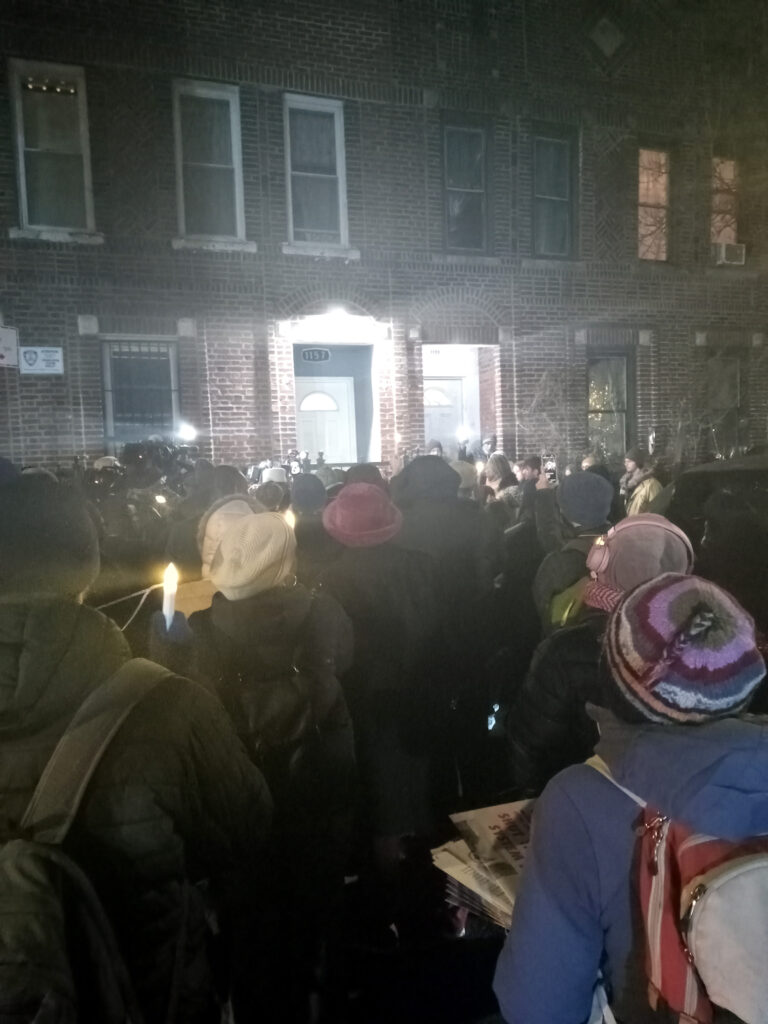
Photo by Sherica Daley
According to reporting by The New York Times at the time, McMellon alleged Diallo was turning counterclockwise back torwards the officers and was reaching into his right coat pocket for what they mistakenly thought was a pistol at the time they began firing. Carrol reportedly shouted, “Gun!” According to media reports at the time of the incident, Diallo had no criminal record, and the officers involved duly acknowledged firing 41 shots in his direction. It was reported during the trial that when one of the officers fell backward during the incident on his approach, the others believed that officer had been shot.
According to court documents, the four impacted officers who were part of the NYPD’s now-defunct, street crime unit, were charged with second-degree murder following the incident. CNN reported at the time that in a pretrial hearing with State Supreme Court Justice Patricia Williams in Bronx County Courthouse, each officer was charged with reckless endangerment and second-degree murder, and faced 25 years to life in prison, if convicted. Each cop testified in their own defense and pleaded not guilty. All four were acquitted at trial in Albany by a jury of seven white men, one white woman, and four black women.
On March 4, 2004, as reported by CNN, Diallo’s mother, Kadiatou (Kadi) Diallo, and Saikou Diallo, his father, accepted a $3 million settlement, following a $61 million wrongful death lawsuit they brought against the City of New York in April 2000. The lawsuit also cited racial profiling, gross negligence and violation of Diallo’s civil rights. Meanwhile, the defense argued that Diallo had not complied with police orders, though it was reportedly not considered whether or not he had understood those orders.
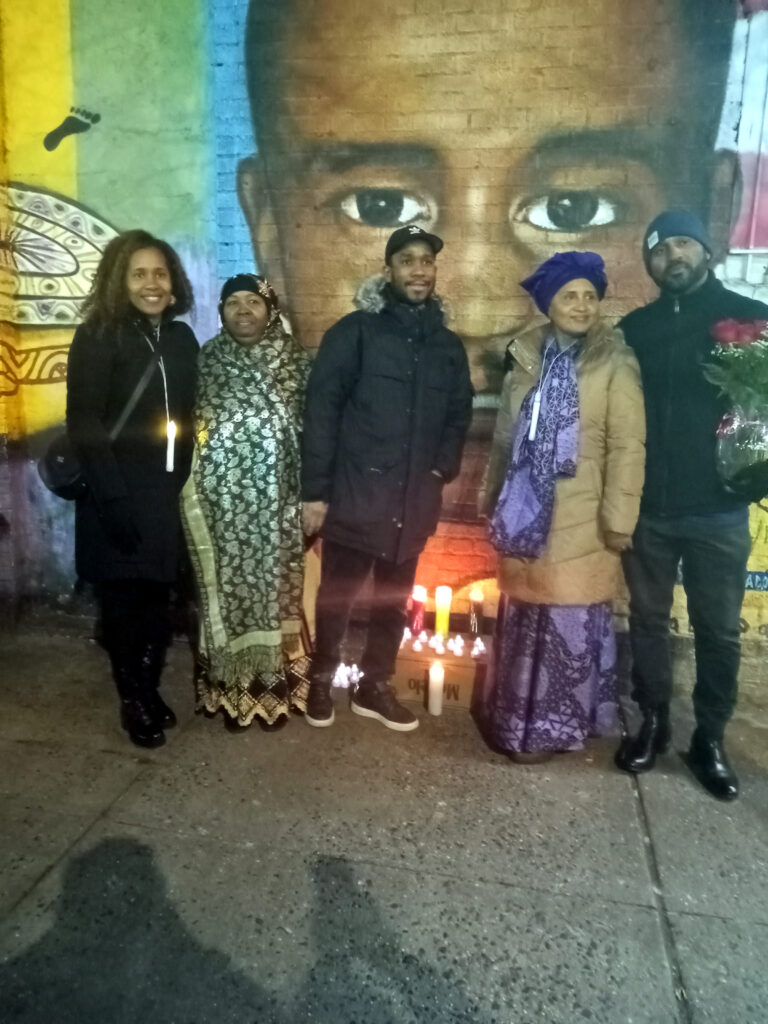
Photo by Sherica Daley
The acquittal of the four officers involved in the shooting prompted outrage in the City and massive street protests ensued, a precursor to those seen following the killing of George Floyd in May 2020. Diallo’s fatal shooting brought the themes of police brutality, racial profiling, and contagious shooting into sharp focus and under the spotlight. According to experts who have studied it, contagious shooting is defined as a sociological phenomenon observed in police personnel in which one person firing on a target can induce others to begin shooting without knowing why they are doing so.
In May 2020, Diallo was one of several young men referenced during a Black Lives Matter protest organized by Norwood Neighbors for Racial Justice that year. [Click here and here to read some of the additional, related coverage of that topic at that time.]
At the vigil, while withstanding frigid temperatures, attendees huddled together at 1177 Wheeler Avenue, kitted out in handwarmers and holding free cups of hot coffee distributed by volunteers near an 18-foot mural of Diallo, painted by Hawa Diallo in 2002. Protestors marched from the site of the mural a few blocks down the street to the site of Diallo’s shooting at 1157 Wheeler Avenue, where candles were seen burning brightly. There were prayers, songs, and a minute’s silence in Diallo’s memory.
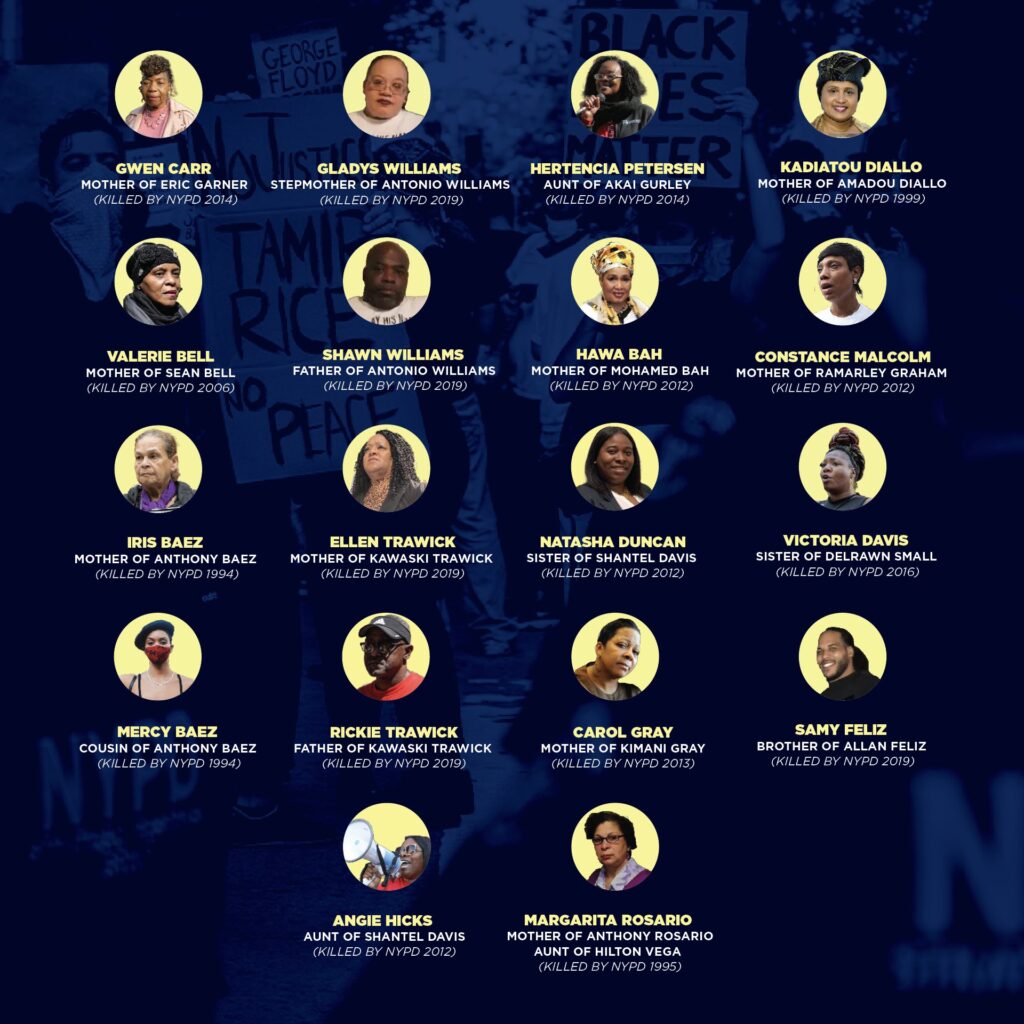
Image courtesy of New York City Council
The vigil came on the back of the passage in New York City Council of the “How Many Stops Act,” a law which requires police officers to make a report following each individual stop of a member of the public, and which had previously been vetoed by New York City Mayor Eric Adams, a former transit police officer. The mayor and others argued the law would unduly burden cops with excessive paperwork. Family members of those affected by police shootings and police brutality had written a letter on Dec. 19, 2023, in support of the bill.
The mayor, the NYPD, and some others felt officers’ time would be better spent on the job, fighting crime. The How Many Stops Act was endorsed by the Black, Latino, and Asian Caucus, the Progressive Caucus, 100 citywide organizations, and 26 relatives of New Yorkers killed during encounters with the police according to the City Council.
The mayor’s veto was later overriden by three-quarters of the New York City Council, with many Black city council members, including District 12 City Council Member Kevin Riley, who represents the north center / north east Bronx, Brooklyn Council Member Chris Banks, Brooklyn Councilmember Chi Ossé, and Manhattan and Harlem Council Member Dr. Yusef Salaam, speaking publicly of their own experiences as young Black men of being stopped, seemingly for no reason, by police.
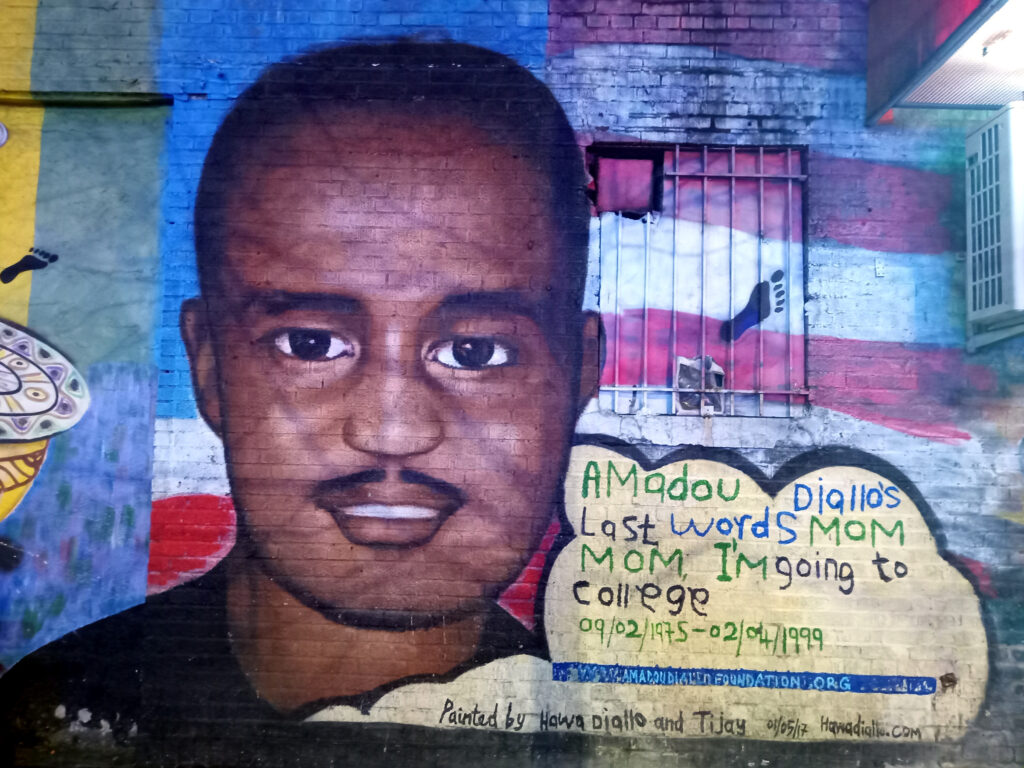
Photo by Sherica Daley
“To the world, we are Black men first before we are elected officials,’ they had written in the context of the bill’s discussion. “We know firsthand about the humiliating experiences of being stopped by police in your own community.” Many of the lawmakers in attendance at the vigil vowed to continue to fight for more rather than less police transparency.
Diallo’s mother was joined at the vigil by Amadou’s two younger siblings, Laura Diallo-Brown and younger brother, also named Amadou Diallo, as well as other mothers from across the City who have also lost children to police shootings. They included Valerie Bell, mother of Sean Bell, an unarmed Black man who, according to reporting by the NY Daily News, was shot in a hail of 50 bullets by an undercover cop in front of a club in Jamaica, Queens in 2006, and Gwen Carr, mother of Eric Garner, a 43-year-old, unarmed Black man, who, as reported at the time by The New York Times, was killed on July 17, 2014 on Staten Island by Daniel Pantaleo, an NYPD officer.
Pantaleo died after putting Garner in a prohibited chokehold while arresting him, according to a report by ABC News at the time. In all three cases, the NYPD police officers involved remained employed by the department. Referring to Diallo’s mother, Carr said during the vigil, “It’s so good to see all of you out in support of this great woman.” She added, “This great woman has been on the battlefield for 25 years.”

Photo by Síle Moloney
Of the 25th anniversary vigil, Diallo’s mother ended the march by speaking to the media, saying it would be the last vigil to be held at the Bronx memorial site. The Diallo family came together to take photos and meet people in the community for the occasion and his mother spoke about the next steps they are taking in preserving her son’s memory.
Turning her pain into passion and purpose, she and the family created the non-profit The Amadou Diallo Foundation and she now splits her time between New York and Washington D.C. with her advocacy work. She has also written a book about her experiences. Diallo passionately described the work with the foundation as being about preservation. Her philanthropic work is based on promoting higher education for future generations and she lectures across the United States about workforce development and police accountability, determined the death of her eldest child will not be in vain.
In honoring her son’s wishes of pursuing a college education, the foundation has partnered with other Bronx entities like Bronx Community College (CUNY) to launch the The Amadou Diallo Foundation Scholarship Program. The program advocates for racial equity and promotes education for students of African descent.
In 2014, Bronx Community College, declared Feb. 4 Annual Amadou Diallo Young Arts and Sci-Tech Day. The one-day program comprises meetings with Bronx middle and high-school students to provide career information, training programs, to achieve a college education.

Photo by Síle Moloney
Standing on the steps where Diallo spent his final moment of life, she said in part, “He had dreams and he was about to achieve his dreams. His dreams was cut short by 41 bullets. We went through a lot of… a lot of situations, including the trial, the acquittal, and then I said to myself I want to pick up Amadou, dust him off and give him back his story. This history must not be forgotten. This history is our history.”
*Síle Moloney contributed to this story.




